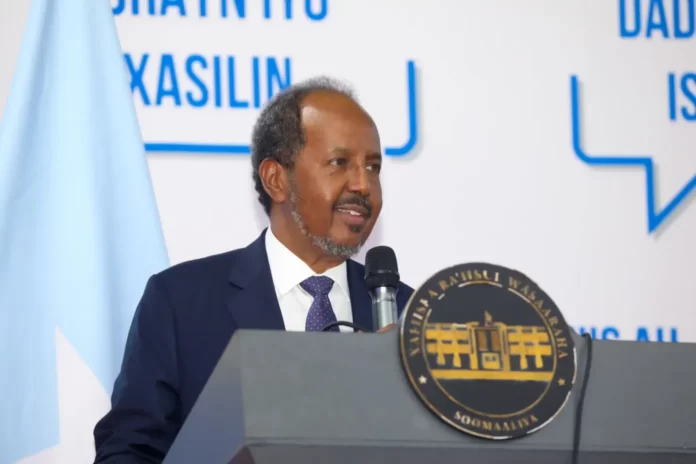Mogadishu (Kaab TV)– President Hassan Sheikh Mohamud of Somalia announced a significant shift in the nation’s electoral process during a meeting with legislators at his palace in the capital, Mogadishu.
The president committed to conducting the next national elections through universal suffrage, moving away from the indirect voting system that has consistently led to crises.
“God willing, the next election will be one-person-one-vote, based on a political party system,” Mohamud declared. He emphasized the importance of party platforms as the “market for selling political ideas.”
Half a century of indirect voting
The Horn of Africa nation has not experienced a one-person, one-vote election in over 50 years. Traditionally, Somali elections have utilized an intricate indirect model.
Under this system, state legislatures and clan delegates elect members of the national parliament, who then select the president.
Clans have long been the central organizing principle in Somali politics, with influential roles like a speaker, prime minister, and president divided among the primary clans.
However, clan rivalries have repeatedly fueled strife and political disputes, creating opportunities for the Al-Qaeda-linked Al-Shabab militants to exploit.
Challenging clan dominance and militant groups
President Mohamud addressed the issue of clan-based politics, stating, “Politics is not about dominance, it is about the organization of ideas, and therefore, clan politics is not relevant to Somali national politics.”
He expressed optimism about the country’s future, saying, “I can see a bright future for this country.”
Since regaining office, Mohamud has pledged to tackle various issues, from violence by Al-Shabab militants to rising inflation and an intensifying drought that could force millions into famine.
The president has launched an “all-out war” against the militants, urging Somalis to help eliminate the extremist group, which he likened to “bedbugs.”
A second term amidst challenges
Last year, Mohamud emerged victorious from a field of 36 candidates, securing the presidency for a second term.
His re-election followed a prolonged political crisis resulting from the federal government and regional states’ failure to agree on a presidential selection mechanism.
Mohamud’s first term (2012-2017) was marred by corruption and internal strife allegations.
Despite progress by pro-government forces, Al-Shabab militants have demonstrated their capacity for lethal attacks against civilian and military targets.
As Somalia prepares for its next polls in May 2026, President Mohamud’s commitment to universal suffrage represents a potential turning point in the nation’s political landscape.


